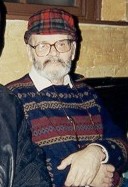
Back لوسيو فولكي Arabic لوسيو فولكى ARZ Lucio Fulci Catalan Lucio Fulci Czech Lucio Fulci Danish Lucio Fulci German Lucio Fulci EML Lucio Fulci Spanish Lucio Fulci Basque لوچو فولچی Persian
Lucio Fulci | |
|---|---|
 Fulci in 1994 | |
| Born | 17 June 1927 Rome, Kingdom of Italy |
| Died | 13 March 1996 (aged 68) Rome, Italy |
| Resting place | Cimitero Laurentino, Rome, Italy |
| Other names | Louis Fuller |
| Occupations |
|
| Years active | 1950–1991 |
| Spouse |
Marina Fulci
(m. 1958; died 1969) |
| Children | 2 |
Lucio Fulci (Italian: [ˈlutʃo ˈfultʃi]; 17 June 1927 – 13 March 1996) was an Italian film director, screenwriter, and actor. Although he worked in a wide array of genres through a career spanning nearly five decades, including comedies and spaghetti Westerns, he garnered an international cult following for his giallo and horror films.
His most notable films include the Gates of Hell trilogy — City of the Living Dead (1980), The Beyond (1981), and The House by the Cemetery (1981)—as well as Massacre Time (1966), One on Top of the Other (1969), Beatrice Cenci (1969), A Lizard in a Woman's Skin (1971), Don't Torture a Duckling (1972), White Fang (1973), Four of the Apocalypse (1975), Sette note in nero (1977), Zombi 2 (1979), Contraband (1980), The New York Ripper (1982), Murder Rock (1984), and A Cat in the Brain (1990). Although a number of films over the years were said to have been "co-produced" by Fulci, he was just allowing them to use his name to promote the films (with the exception of City of the Living Dead, which he did actively attempt to obtain some funding for).[1]
Owing to his brand of expressive visuals and unconventional storytelling, Lucio Fulci has been called "The Poet of the Macabre"[2][3] by genre critics and scholars, originally a reference to Edgar Allan Poe, whose work he freely adapted in The Black Cat (1981).[4] The high level of graphic violence in many of his films, especially Zombi 2, The Beyond, Contraband and The New York Ripper, has also earned him the nickname "The Godfather of Gore",[5] which he shares with Herschell Gordon Lewis.
- ^ Howarth, Troy (2015). Splintered Visions: Lucio Fulci and his Films. Midnight Marquee Press. page 202.
- ^ "Lucio Fulci, poeta del macabro (e non solo)". fondazionecsc.it. Centro Sperimentale di Cinematografia Roma. 15 September 2016. Retrieved 3 September 2021.
- ^ Père, Olivier (13 July 2012). "Lucio Fulci, le poète du macabre". arte.tv. G.E.I.E. Arte. Retrieved 3 September 2021.
- ^ Pattin, Pierre (February 1982). "Lucio Fulci, poète du macabre". Mad Movies. No. 22. Paris: Jean-Pierre Putters. p. 22.
- ^ "Lucio Fulci: Godfather of Gore". houseofhorrors.com. Archived from the original on 22 October 2006. Retrieved 1 July 2012.